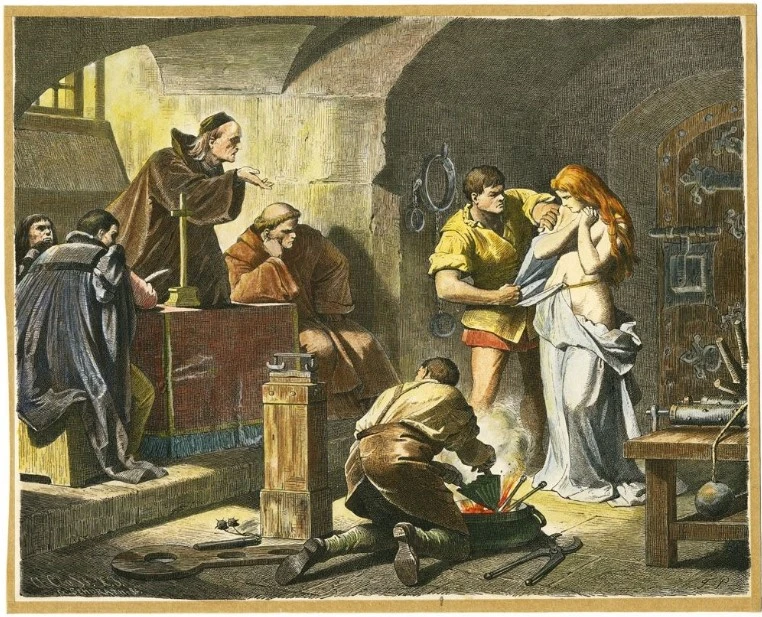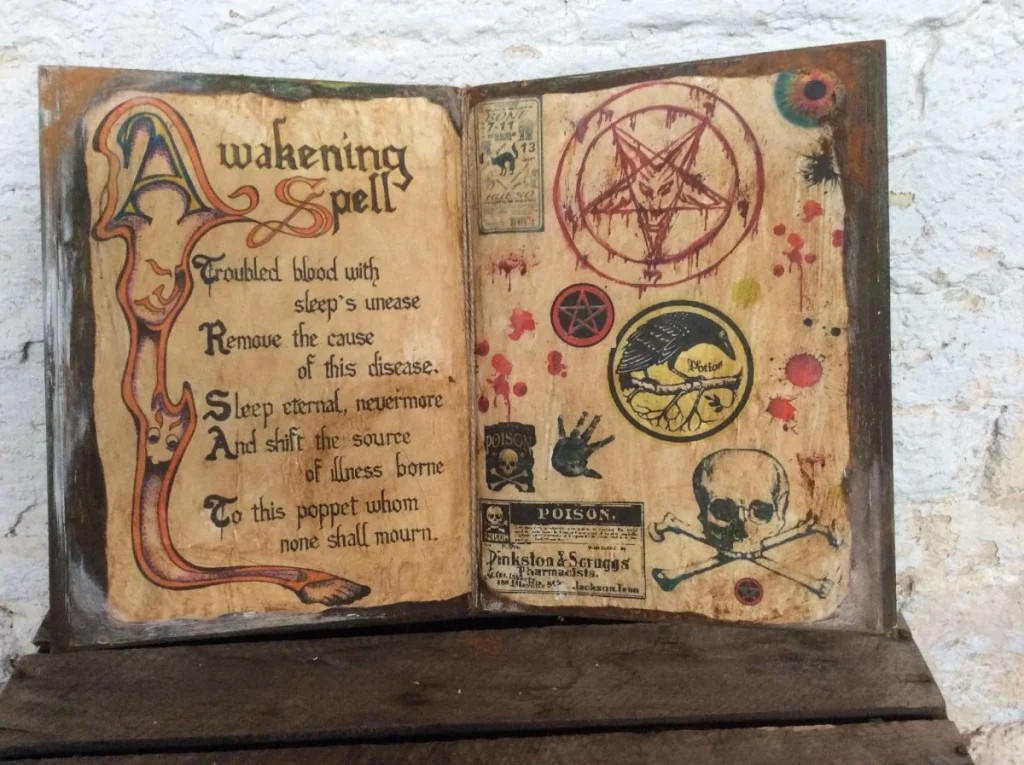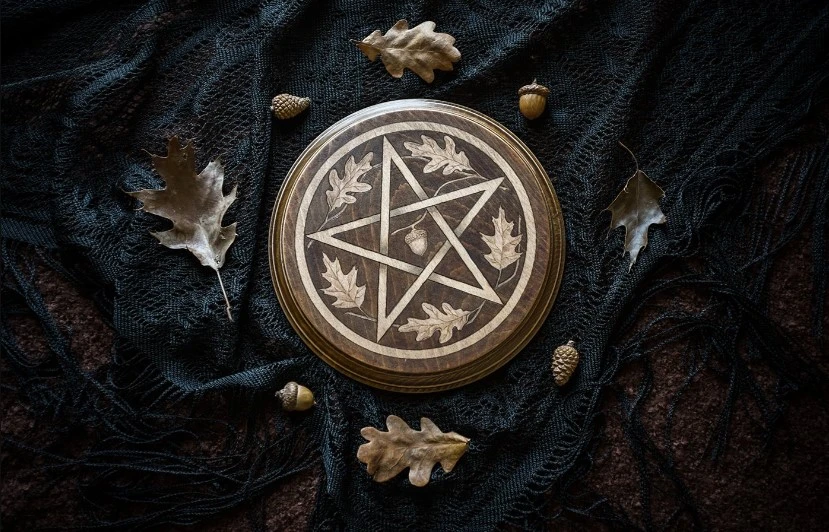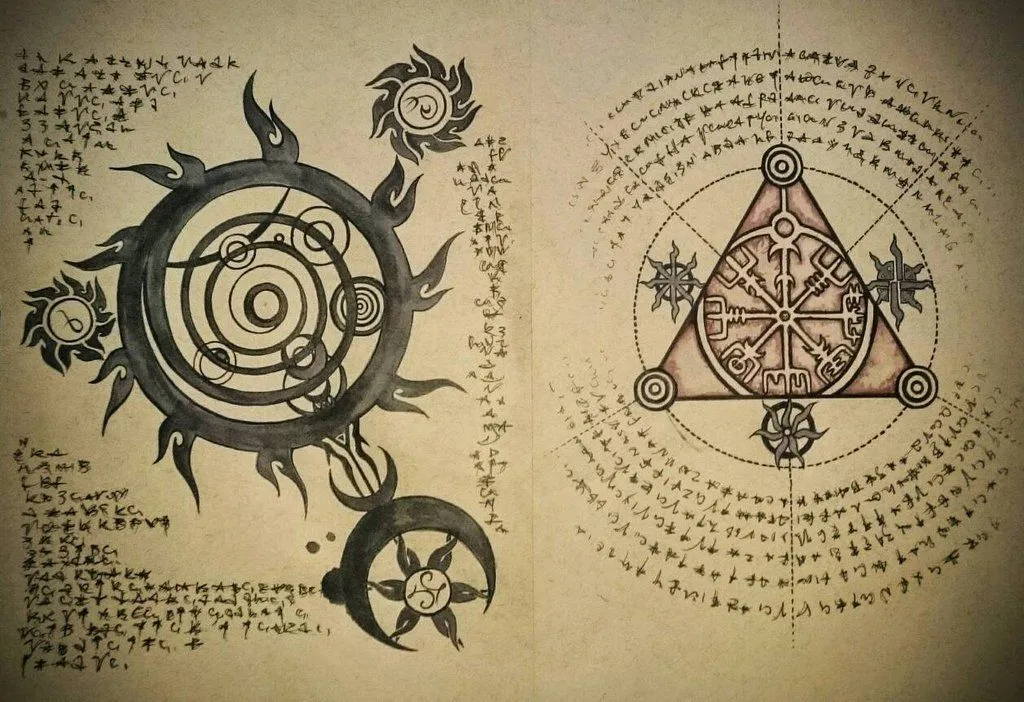In this exploration, we embark on a profound inquiry: What does the Bible say about witchcraft, and why does it resolutely prohibit its practice? Our journey leads us to unveil the captivating allure of magic, and its role in inspiring diverse interpretations and beliefs, while also delving into how Christianity, alongside other belief systems, grapples with the enigmatic nature of magic and spells. Additionally, we will cite the most common verses about witchcraft mentioned in the Bible, shedding light on the scriptural perspective.
Understanding Witchcraft
Understanding witchcraft requires a multifaceted exploration that encompasses historical, cultural, and religious dimensions. Witchcraft, often associated with supernatural powers and rituals, has manifested in various forms across civilizations, each with its distinct connotations. In historical contexts, it was frequently linked to pagan practices and nature worship. The term “witchcraft” has evolved over time, encompassing spellcasting, divination, and communion with the spiritual realm.
From a cultural standpoint, witchcraft’s portrayal in literature, folklore, and media has shaped perceptions, blending fascination with fear. Religious perspectives vary widely, with Christianity and other faiths often categorizing witchcraft as incompatible with their doctrines due to concerns of idolatry and supernatural manipulation. As we delve deeper, an understanding of witchcraft emerges as a complex interplay of human imagination, cultural narratives, and spiritual beliefs, revealing its intricate role in shaping societies and individual perceptions of the mystical, thereby facilitating a more nuanced interpretation of what does the bible say about magic.
What Does the Bible Say About Witchcraft in the Old Testament
Witchcraft in the Bible occupies a significant place, primarily within the context of the Old Testament. What the Bible says about spells is deeply rooted in the religious and cultural milieu of the ancient Israelites. In the Hebrew Scriptures, witchcraft is often associated with practices that deviated from the worship of the one true God, Yahweh.
The strongest condemnation of witchcraft can be found in the Book of Exodus, which it states, “You shall not permit a sorceress to live” (Exodus 22:18, ESV). This commandment reflects the gravity with which the ancient Israelites viewed witchcraft and its practitioners. The term “witch” here likely refers to one who practices sorcery or divination, which were common aspects of ancient magical practices.
Deuteronomy 18:10-12 (ESV) provides further insight into the biblical stance on witchcraft:
“There shall not be found among you anyone who burns his son or his daughter as an offering, anyone who practices divination or tells fortunes or interprets omens, or a sorcerer or a charmer or a medium or a necromancer or one who inquires of the dead, for whoever does these things is an abomination to the Lord.”
This passage outlines a range of practices that were considered detestable in the eyes of God, including divination, necromancy (communication with the dead), and other forms of sorcery. The underlying message is that such practices represented a departure from the monotheistic worship of Yahweh and often involved seeking guidance or power from sources other than God.
It’s important to note that what the bible says about spells should be understood within the historical and cultural context of the time. The ancient Israelites lived in a world where magical and divinatory practices were prevalent, often associated with pagan religious beliefs and practices. The prohibitions against witchcraft in the Bible were aimed at preserving the purity of the Israelites’ faith and ensuring their allegiance to Yahweh alone.

What Does the Bible Say About Magic in the New Testament
In the New Testament, the concept of magic is not as extensively discussed as it is in the Old Testament, but there are passages that provide insights into the biblical perspective on the subject. The New Testament generally emphasizes the importance of faith in Jesus Christ, ethical living, and a relationship with God through the Holy Spirit.
One notable reference to magic is found in the Book of Acts, specifically in the account of Simon the Sorcerer (Acts 8:9-24, ESV). Simon was a magician in Samaria who had gained a following through his sorceries. When Philip the Evangelist began preaching and performing miracles in Samaria, many people believed and were baptized, including Simon. However, Simon’s motives became questionable when he offered money to the apostles, hoping to obtain the power to impart the Holy Spirit through the laying on of hands.
Peter’s response to Simon’s request provides insight into what the bible says about spells and magic in the New Testament:
“But Peter said to him, ‘May your silver perish with you, because you thought you could obtain the gift of God with money! You have neither part nor lot in this matter, for your heart is not right before God. Repent, therefore, of this wickedness of yours, and pray to the Lord that, if possible, the intent of your heart may be forgiven you.'” (Acts 8:20-22, ESV)
This passage reflects a clear distinction between the power of God and the manipulation often associated with magical practices. Peter rebukes Simon for attempting to buy or manipulate spiritual gifts, highlighting the importance of genuine faith and a righteous heart before God.
Additionally, in Galatians 5:19-21 (ESV), “sorcery” is listed among the “works of the flesh,” which are considered contrary to the life led by the Holy Spirit:
“Now the works of the flesh are evident: sexual immorality, impurity, sensuality, idolatry, sorcery, enmity, strife, jealousy, fits of anger, rivalries, dissensions, divisions, envy, drunkenness, orgies, and things like these.”
While the New Testament does not extensively address magic, these passages underscore the importance of genuine faith, ethical conduct, and a reliance on the power of God’s Spirit rather than attempting to manipulate spiritual forces through magical practices.
Overall, the New Testament’s emphasis on faith, righteousness, and the indwelling of the Holy Spirit provides a framework through which the subject of magic is viewed in the context of Christianity.
10 Bible Verses on Witchcraft
- Exodus 22:18 (ESV) – “You shall not permit a sorceress to live.”
- Leviticus 19:31 (ESV) – “Do not turn to mediums or necromancers; do not seek them out, and so make yourselves unclean by them: I am the Lord your God.”
- Leviticus 20:6 (ESV) – “If a person turns to mediums and necromancers, whoring after them, I will set my face against that person and will cut him off from among his people.”
- Deuteronomy 18:10-12 (ESV) – “There shall not be found among you anyone who burns his son or his daughter as an offering, anyone who practices divination or tells fortunes or interprets omens, or a sorcerer or a charmer or a medium or a necromancer or one who inquires of the dead, for whoever does these things is an abomination to the Lord.”
- 1 Samuel 15:23 (ESV) – “For rebellion is as the sin of divination, and presumption is as iniquity and idolatry.”
- 2 Kings 21:6 (ESV) – “And he burned his son as an offering and used fortune-telling and omens and dealt with mediums and with necromancers. He did much evil in the sight of the Lord, provoking him to anger.”
- Isaiah 8:19 (ESV) – “And when they say to you, ‘Inquire of the mediums and the necromancers who chirp and mutter,’ should not a people inquire of their God? Should they inquire of the dead on behalf of the living?”
- Galatians 5:19-20 (ESV) – “Now the works of the flesh are evident: sexual immorality, impurity, sensuality, idolatry, sorcery, enmity, strife, jealousy, fits of anger, rivalries, dissensions, divisions…”
- Revelation 21:8 (ESV) – “But as for the cowardly, the faithless, the detestable, as for murderers, the sexually immoral, sorcerers, idolaters, and all liars, their portion will be in the lake that burns with fire and sulfur, which is the second death.”
- Acts 8:9-11 (ESV) – “But there was a man named Simon, who had previously practiced magic in the city and amazed the people of Samaria, saying that he himself was somebody great. They all paid attention to him, from the least to the greatest, saying, ‘This man is the power of God that is called Great.'”
These verses highlight what the bible says about spells, sorcery, and related practices, portraying them as activities that deviate from the worship of God and are often associated with idolatry and spiritual manipulation.
The Bible’s Emphasis on God’s Authority and Protection
Throughout the Scriptures, the emphasis is on God’s sovereignty, authority, and protection over His people. The Bible encourages believers to put their trust in God, seek His wisdom, and rely on His providence. This means avoiding practices that involve seeking supernatural power from sources other than God.
Here’s a closer look at the Bible’s emphasis on these concepts:
1. God’s Authority: The Bible portrays God as the ultimate authority over all creation. The opening verses of the book of Genesis, for example, depict God as the creator of the universe, establishing His authority over the entire cosmos. Throughout both the Old and New Testaments, God’s authority is highlighted through His roles as lawgiver, judge, and ruler. This authority is often presented as both just and merciful, with God’s commands and decrees serving as the foundation for moral and ethical conduct, therefore, affirming what does the bible say about witchcraft and why it has been forbidden.
2. Divine Sovereignty: The concept of God’s sovereignty underscores His complete control and dominion over all aspects of existence. This includes the natural world, human affairs, and even the course of history. Passages in the Bible emphasize that God’s plans and purposes cannot be thwarted, and His will ultimately prevail. The story of Joseph in the book of Genesis, for instance, illustrates God’s sovereignty over human events, even in the midst of challenging circumstances.
3. God’s Protection: The Bible frequently portrays God as a protector and refuge for His people. Various passages emphasize the idea that those who trust in God can find safety and shelter under His wings. The well-known 23rd Psalm, for instance, speaks of God as a shepherd who guides, comforts, and protects His flock. Other narratives, such as the story of Daniel in the lions’ den or the account of the Israelites’ deliverance from slavery in Egypt, highlight God’s intervention and protection in times of danger. Thus confirming what does the bibe say about witchcraft in the old testament.
4. Covenant Relationship: The Bible often portrays God’s authority and protection within the context of a covenant relationship. A covenant is a sacred agreement between God and His people, in which God offers His love, guidance, and protection, and in return, people commit to following His commands and remaining faithful. The covenants established with figures like Noah, Abraham, Moses, and David emphasize God’s commitment to His people’s well-being and the expectation of obedience on their part.
In summary, instead of turning to witchcraft or sorcery, the Bible encourages believers to seek God’s guidance through prayer, study of His Word, and reliance on the Holy Spirit. The focus is on developing a personal relationship with God and walking in accordance with His will.
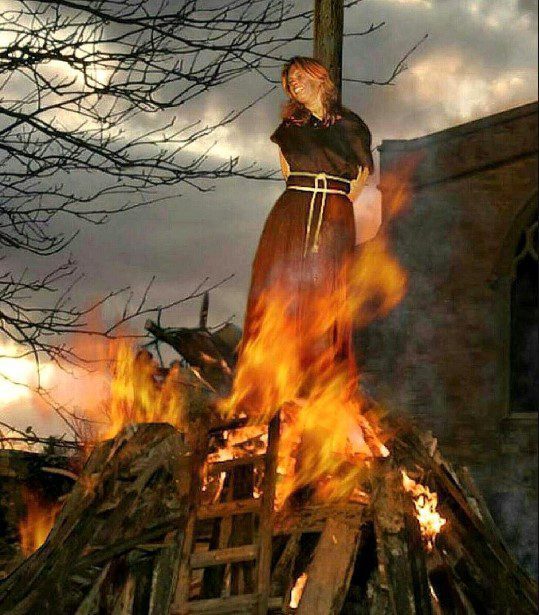
Miracles vs Witchcraft in The Bible
What the bible says about spells, witchcraft and miracles is completely different and carries very different implications. Let’s explore both of these concepts separately:
Miracles: Miracles in the Bible are extraordinary events that are attributed to divine intervention and supernatural power. They often defy natural laws and are considered acts of God that demonstrate His authority, power, and presence. Miracles serve various purposes, such as confirming the authenticity of a prophet or messenger, displaying God’s mercy and compassion, and emphasizing spiritual truths.
Some well-known miracles in the Bible include:
- The Parting of the Red Sea: In the book of Exodus, God parted the Red Sea to allow the Israelites to escape from the pursuing Egyptian army.
- Jesus’ Miracles: In the New Testament, Jesus performed numerous miracles, including healing the sick, restoring sight to the blind, turning water into wine, and raising the dead. These miracles were seen as signs of his divinity and the inauguration of God’s Kingdom.
- The Resurrection of Jesus: The resurrection of Jesus from the dead is the ultimate miracle in Christianity, affirming his victory over death and sin.
Witchcraft:
What the bible says about spells and witchcraft is generally negative. It refers to practices involving supernatural powers or magic that are often outside the realm of God’s divine authority. In the Bible, witchcraft is associated with sorcery, divination, and attempts to gain power or insight from sources other than God.
The Bible condemns witchcraft and related practices, particularly in the context of Israelite religious practices. In the Old Testament, passages like Deuteronomy 18:10-12 explicitly warn against engaging in witchcraft, sorcery, divination, and other occult practices. These practices were seen as a deviation from the worship of the one true God and a form of idolatry.
A notable story involving witchcraft is the account of the Witch of Endor in 1 Samuel 28. Saul, the king of Israel, sought out the witch to summon the spirit of the deceased prophet Samuel for guidance, a practice that was forbidden in Israelite religious law.
In summary, miracles in the Bible are extraordinary events attributed to God’s intervention that demonstrate His power and presence, while witchcraft refers to practices involving supernatural powers outside the realm of God’s authority and is generally portrayed negatively in the Bible. The distinction between the two lies in their alignment with either divine or non-divine sources of power and authority.

Other Religions that Condemn Witchcraft
What the bible says about spells and witchcraft is also shared by other religions, especially when it involves practices that deviate from the religious beliefs and practices of those faiths. Here are a few examples of other religions that also generally discourage or condemn witchcraft:
- Islam: In Islam, witchcraft is considered haram (forbidden). The practice of magic or witchcraft is seen as a form of disbelief in the One God (Allah) and is condemned in the Quran. Islam promotes monotheism and the belief in the unseen realm but strictly forbids the use of magic and any attempt to manipulate supernatural forces.
- Judaism: Much like what the bible says about spells, Judaism condemns practices that involve witchcraft, sorcery, and divination. These practices are seen as incompatible with the monotheistic worship of Yahweh and are often considered forms of idolatry.
- Hinduism: While Hinduism is a diverse religion with a wide range of beliefs and practices, some sects and scholars within Hinduism discourage or condemn certain forms of witchcraft or black magic same as what the bible says about spells and witchcraft, often classifying them as tamasic (negative) practices. Hinduism encompasses a complex array of beliefs, and perspectives on witchcraft can vary based on different traditions.
- Buddhism: Buddhism, generally rooted in ethical conduct and the Eightfold Path, discourages practices that involve harming others or manipulating supernatural forces for personal gain. However, unlike what the bible says about spells and witchcraft, the stance on practices often associated with witchcraft can vary among different Buddhist traditions and cultures.
- Sikhism: Sikhism also discourages practices that involve supernatural manipulation or harmful intentions same as what the bible says about spells and witchcraft. The emphasis in Sikhism is on meditation, ethical conduct, and a strong belief in the one true God. Practices that deviate from these principles may be considered incompatible with Sikh beliefs.
It’s important to note that within each religion, there can be variations in beliefs and interpretations. While many religious traditions discourage or condemn witchcraft, the specific views and nuances can vary based on cultural, historical, and doctrinal factors. Additionally, modern perspectives within these religions may adapt and evolve in response to changing societal and cultural dynamics.
Conclusion
In this article we talked about “what does the bible say about witchcraft”, and we explained the Bible’s perspective on witchcraft which is rooted in its historical and cultural context, where the practice was often associated with pagan rituals and idolatry. The Old Testament unequivocally condemns witchcraft and divination, considering them detestable in the eyes of God. Modern Christian interpretations vary, with some maintaining a strict stance and others emphasizing the underlying principles of monotheism and ethical living.
Ultimately, the Bible’s teachings on witchcraft prompt believers to prioritize their relationship with God, seek His guidance, and live a life that reflects His values. As with any scriptural interpretation, understanding the context and seeking guidance from religious leaders is essential for a comprehensive understanding of the topic.

